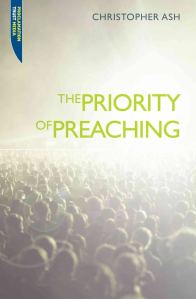
In this book Christopher Ash sets out to argue for the importance of preaching in the church. Ash writes, “My task is to persuade (or at least unsettle) those doubtful about preaching, and to deepen the conviction of those already converted to the priority of preaching. Above all I want to encourage us to our desks, our prayer, our preparation, and our love for people, with a new spring in our steps as we labour at loving people by preaching to them week by week.”[1] Ash laments that some have abandoned preaching, claiming that it’s outdated and an obsolete method of spiritual formation.[2] However, Ash challenges this believe by arguing that preaching is powerful and authoritative not because of the preacher but because of the Word they preach. The Biblical texts Ash draws his conclusions from about preaching are found in Deuteronomy. The reason for this is because according to Ash, “it seems…that Deuteronomy gives us God’s mandate for preaching.”[3] Chapter one focuses on the authority of preaching, which Ash argues is a borrowed authority from God’s Word.[4] In the second chapter Ash expounds on the transformative nature of Word-centered preaching. Lastly, Ash focuses in chapter three on the assembly, and how God’s Word shapes his people.
In terms of weaknesses, I thought Deuteronomy was an interesting choice of a proof text to argue for the importance and relevance of preaching. I don’t doubt any of Ash’s arguments from Deuteronomy or that there is clear continuity from Deuteronomy to the New Testament church. However, since much of his aim seems to be convincing the skeptic, I’m surprised he didn’t reference a New Testament passage such as Matthew 28, where Jesus tells the disciples to make disciples, “teaching them to obey all that I have commanded.”
In terms of strengths, I thought he struck the heart of skeptical thinking toward preaching. He addresses the ecclesiological thinking pioneered by Robert Schuller when he writes, “We live in a culture where…the most friendly thing we can say in welcoming newcomers is, ‘We want to know what you think.’ But – dare I say it – God does not want to know what we think. He wants us to know what he thinks.”[5]
I also thought Ash was encouraging to pastors. I would guess everyone who preaches regularly would have felt a renewed confidence in God’s Word and His ability to use their ordinary sermons after reading this book. The book was also quite practical. He offers tips on clarity in preaching[6] and the importance of urging people to act on truth rather than simply contemplate it.[7] Also helpful were his comments on monologue vs. discussion. Ash writes, “Discussion is comfortably in line with the spirit of the age. We are happy to discuss and interpret.”[8] I need to keep in mind that people need to be confronted by God’s truth in a way that will compel them to respond in action rather than simply contemplate. I’m reminded of the man in Pilgrim’s Progress who joined Christian for a while and was eager to discuss theology, but Christian finally had to depart from him when he saw that the man didn’t finally want to believe any of it.[9]
The book was full of helpful quotes. One was from J.I. Packer to aspiring preachers, “Read yourself full, think yourself clear, pray yourself hot, let yourself go.”[10]
Overall, it was a good book that is sure to be an encouragement to preachers.
[1] Christopher Ash, The Priority of Preaching, Revised edition (Fearn, Ross-shire, Scotland; London: Christian Focus, 2009). 13.
[2] Ash. 17-18
[3] Ash. 21.
[4] Ash. 37.
[5] Ash. 35.
[6] Ash. 62.
[7] Ash. 64.
[8] Ash. 35.
[9] John Bunyan, The Pilgrim’s Progress (Wheaton, Ill: Crossway, 2009), https://www.crossway.org/books/the-pilgrims-progress-hccase/.
[10] Ash, The Priority of Preaching. 67.

Mike McGregor
Mike McGregor (MDiv, Reformed Theological Seminary) is Director of College Ministry at First Baptist Church in Durham, N.C. You can follow him on Twitter at @m5mcgregor.




